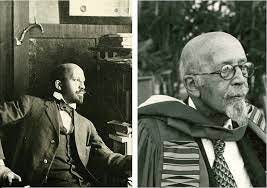Issue #84: Education July 13, 2022
What you probably already know:
Dr. William Edward Burghardt Du Bois (pronounced “doo-BOYS”) was an American sociologist, historian, author, editor, and the leading Pan-African civil rights activist of the 20th century.
Dr. Du Bois graduated from Fisk University, the University of Berlin, and was the first African-American to earn a doctorate from Harvard University. He was a professor of history, sociology, and economics at Atlanta University.
Dr. Du Bois was one of the founders of the Niagara Movement that opposed the Atlanta Compromise of Booker T. Washington, as well as one of the founders of the National Association for the Advancement of Colored People (NAACP).
Dr. Du Bois was very active in the Pan-African movement, organizing the Pan-African Congress conventions, while verbally fighting with Marcus Garvey and his Back-to-Africa movement.
Dr. Du Bois was the editor of the NAACP’s journal, “The Crisis,” and a prolific author of such seminal books as The Souls of Black Folk (1903), Black Reconstruction in America (1935), and his autobiography, Dusk of Dawn (1940). He published a total of 25 books.
Thank you for reading and/or listening to this post. If you like this post, please “Like” this post by clicking the “Like” button at the bottom of this post. We would greatly appreciate reading your comment(s). Also please scroll down to the end for more information about supporting our publication.
What you may not know:
Dr. W.E.B. Du Bois was not only an eminent sociologist who started publishing important sociological research as early as 1898. Du Bois was the first sociologist to treat the field as a science by employing empirical research interlaced with quantitative and qualitative analyses.
The prevailing method used by white sociologists at the time was merely recording very superficial observations without actually trying to understand the communities supposedly being studied.
As Dr. Aldon Morris, professor of Sociology and African American Studies at Northwestern University, wrote in his 2015 book, The Scholar Denied: W.E.B. Du Bois and the Birth of Modern Sociology, there was a reason for this: what passed for “scholarship” in the late 19th and early 20th centuries was institutionalized racism towards African-Americans that accepted as fact the “inferiority” of Black people and never took into account the impact of slavery, poverty, discrimination, and social stigma on the Black community.
However, in the early decades of the 20th century, Dr. Du Bois perfected his own methodology, embedding himself in the communities he was studying, listening and collecting data, and doing the actual hard work his white colleagues would not.
The American Sociological Association (ASA) was founded in 1905 at Johns Hopkins University and refused to admit Dr. Du Bois as a member because of his race. The first president of the ASA, Lester Frank Ward, was held up as the “founder” of sociology.
Dr. Morris, who was elected president of the ASA in 2021, recently convinced the organization to rename its top award after Dr. Du Bois.
According to Dr. Morris, “Du Bois was the first sociologist to articulate the agency of the oppressed.” Dr. Morris continued, “Du Bois established truth as a standard, elevating sociology to an ‘emancipatory social science’…and encouraged a more open and inclusive academia.”
Although Dr. DuBois’ contributions to the field of sociology have been mostly ignored, by the 1930s he was widely recognized as the true founder of the modern sociological discipline.
Du Bois’ Later Years
Dr. Du Bois considered himself an atheist, a socialist, and was vocally anti-war. Those philosophies angered many in the mainstream, including the NAACP. In the 1950s “Red Scare” phase, the FBI charged him as an agent of a foreign power and he was arrested and indicted. His passport was also confiscated.
The passport was returned in 1958 and Dr. Du Bois proceeded to travel to the Soviet Union and to China where he was revered.
In 1961, the president of the newly independent country of Ghana, Kwame Nkrumah, invited Dr. Du Bois and his wife, African-American author and Communist activist Shirley Graham Du Bois, to live and work in Ghana. President Nkrumah gifted the couple with a 7-room house and a staff of four. Dr. Du Bois was granted full Ghanian citizenship in February 1963.
Before he left for Ghana, he joined the American Communist Party, making him a target of both the white and Black press in America. The Chicago Defender printed an article with the headline: “Du Bois paints in red.”
Dr. Du Bois died at age 95 on August 27, 1963, on eve of the March on Washington. He had hoped to be well enough to travel to Washington for the March, but even if he had been well enough, the United States refused to renew the passports of the Du Boises.
At the March, Roy Wilkins, then president of the NAACP, at first refused to even acknowledge the death of Dr. Du Bois, but he relented at the last minute.
Meanwhile, Dr. Du Bois was given a state funeral with full honors in Accra, the capital of Ghana. Ambassadors for all of the international embassies in Ghana attended the funeral; all except the Ambassador from the United States, who did not even send a message of condolence.
Before his death, Dr. Du Bois stated that becoming a citizen of Africa’s first independent sub-Saharan country was the happy end of his journey back to Africa from which his great-grandfather had been stolen and sold into slavery in America.
References:
Du Bois as eminent sociologist: https://news.harvard.edu/gazette/story/2018/10/lecturer-explains-du-boiss-role-as-eminent-sociologist/#:~:text=Rights%20leaders%20since.-,%E2%80%9CDu%20Bois%20was%20the%20first%20sociologist%20to%20articulate%20the%20agency,for%20the%20good%20of%20all
Dr. Aldon D. Morris:
Let us know your thoughts on Dr.W.E.B. Du Bois
Help us grow the “We Are Speaking” Publication and Podcast
Read and listen to “We Are Speaking” with the iOS app!
Please subscribe for free or upgrade your subscription to the paid level.





